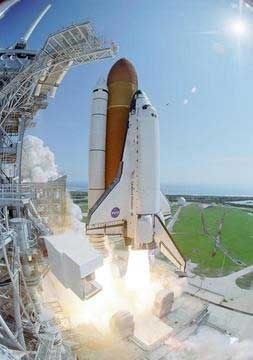 Rocket science doesn't come easy these days. Following the February 2003 Columbia tragedy, NASA called off all shuttle missions while the disaster was investigated and the shuttle program itself was reevaluated.
Rocket science doesn't come easy these days. Following the February 2003 Columbia tragedy, NASA called off all shuttle missions while the disaster was investigated and the shuttle program itself was reevaluated.Finally, after 29 months of no launches, Discovery took off on Tuesday. Immediately, problems were noticed--most serious of all, a recurrence of falling foam debris, almost the same size as that which brought down Columbia. Thankfully, the Discovery appears not to have been seriously harmed and the crew should not be in any jeopardy for the rest of its mission.
However, with this latest setback, NASA has once again grounded the space shuttle fleet. "Until we fix this, we're not ready to fly again," said shuttle program manager Bill Parsons.
After the Columbia disaster, NASA spent over $1 billion in trying to fix the shuttle--which, according to President Bush's vision, is due to be retired in 2010 with the completion of the International Space Station. What is now evident is that there is still much work left to be done, and we are unfortunately not ready to take that next step. NASA will now return to square one while its public image takes a beating and people question the worth of manned space exploration itself.
On that point at least, the answer is obvious: yes, it always has been, and always will be worth it. In light of the space program's current troubles, it's worth noting that July 20 marked the 36th anniversary of the Apollo 11 moon landing. Back in 1969, using computers no more powerful than today's simplest handheld calculators, we were able to send two men to the moon and bring them back home safely. Let that serve as our inspiration to proceed, then, to do the things "not because they are easy, but because they are hard."
No comments:
Post a Comment